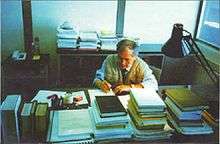Japanese people in Turkey
| ||
| Total population | ||
|---|---|---|
| 1,430 (2010) | ||
| Regions with significant populations | ||
| Istanbul · Ankara | ||
| Languages | ||
| Turkish · Japanese | ||
There is a medium-sized population of Japanese people in Turkey, comprising mostly recent expatriates from Japan and their descendants born in Turkey. As of September 2010, their numbers were recorded at 1,430 by the Japanese Ministry of Foreign Affairs.[1] Most Japanese living in Turkey are based in Ankara and Istanbul.
There was a very small population of Japanese in the country prior to 1945 when Turkey declared war on Germany and Japan during World War II; following the conflict and the severing of Turkey's trade and diplomatic relations with Japan, most had left.[2] A Japanese travel agent and information office had closed down its presence and all its personnel had left. There were also no Japanese businessmen left in Turkey.[2] Only people with diplomatic and consular status remained, numbering about fifteen. They were interned at a consulate building in Ayaspaşa, Istanbul. Some people who resided in the neighbourhood at that time remember that the interned Japanese nationals were sometimes permitted to go to Yıldız Park for a walk.[2]
Istanbul
As of 2011 about 900 Japanese persons resided in Istanbul; 768 were officially registered with the Japanese Consulate of Istanbul as of October 2010. Of those living in Istanbul, about 450-500 are employees of Japanese companies and their family members, making up around half of the total Japanese population. Others include students of Turkish language and culture, business owners, and Japanese women married to Turkish men. Istanbul has several Japanese restaurants, a Japanese newspaper, and a 32-page Japanese magazine.[3]
Education
The Istanbul Japanese School is a Japanese international school.
Istanbul also has a weekend Japanese education programme, The Japanese Saturday School in Istanbul.[4]
The Ankara Japanese School (アンカラ日本人学校) previously existed.[5] It opened on April 1, 1979 (Showa 54),[6]
Notable individuals
- Masatoshi Gündüz Ikeda, Mariko Erdoğan
See also
References
- ↑ "Japan-Turkey Relations". Ministry of Foreign Affairs (Japan). September 2010.
- 1 2 3 Turkey's Declaration of War on Japan at the End of the Second World War (Rona Aybay)
- ↑ Tuna, Banu. "Sakın çin çang çong demeyin" (Archive). Hürriyet. 11 November 2011. Retrieved on 11 August 2015.
- ↑ "中近東の補習授業校一覧(平成25年4月15日現在)" (Archive). Ministry of Education, Culture, Sports, Science and Technology (MEXT). Retrieved on May 10, 2014.
- ↑ "過去に指定・認定していた在外教育施設" (Archive). Ministry of Education, Culture, Sports, Science and Technology. Retrieved on January 15, 2015.
- ↑ "学校の概要" (Archive). Ankara Japanese School. Retrieved on January 15, 2015. "Horasan Sok.No.6 G.O.P.ANKARA TURKEY"
